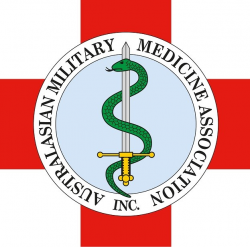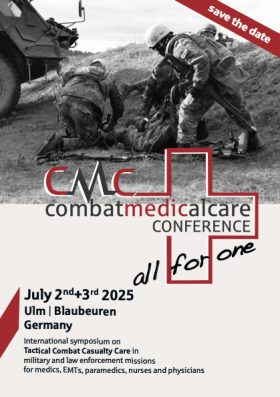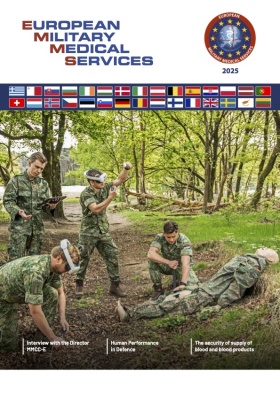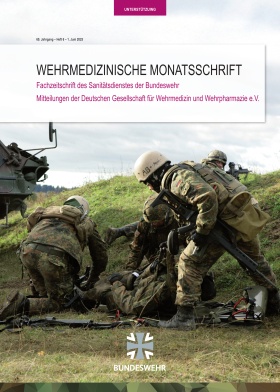
Almanac
Lithuania, Republic of
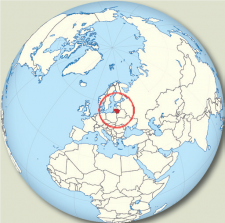
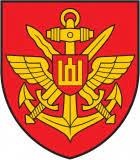
Surgeon General
Inga Janceviciene, MD
Colonel
Chief of Joint Medical Department
Kapsų g. 44, 02117 Vilnius
LITHUANIA
Pictures and Graphics: Wikimedia Commons
National Context and Summary
Republic of Lithuania is a country in the Baltic region of Europe. It is one of three Baltic states and lies on the eastern shore of the Baltic Sea. Lithuania shares land borders with Latvia to the north, Belarus to the east and south, Poland to the south, and Russia to the southwest. It has a maritime border with Sweden to the west on the Baltic Sea. Lithuania covers an area of 65,300 km2 (25,200 sq mi), with a population of 2.8 million. Its capital and largest city is Vilnius; other major cities are Kaunas and Klaipeda. Lithuanians belong to the ethno-linguistic group of the Balts and speak Lithuanian, one of only a few living Baltic languages.
National Health System
The Ministry of Health of the Republic of Lithuania is an institution that exercises executive powers, carries out State administration functions established by the laws and other legal acts in the health care sector, and implements State policy in the health care sector.
Mission is to form and implement health policy that ensures public health, high quality health promotion activities, and rational use of resources.
Strategic goals of the Ministry of Health
Assurance of public health care by strengthening the health of the population, prevention and control of diseases. Improvement of public health care activities in compliance with the requirements of EU legal acts. Assurance of effective prevention of diseases, reduction of the morbidity and mortality of the population, giving special attention to the health care of pregnant women and infants, health preservation and improvement of children and youth. Reduction of morbidity from communicable and non-communicable diseases by removing them causing factors as well as reducing consequences that occur due to traumatic events and accidents.
Refining observation of public health and privity of population. Improvement of measures of fast and effective response to public health threats. Strengthening of public mental health promoting a social environment favorable to individuals. Active prevention of alcohol, drug addiction and other addictive disorders. Unification of primary individual and public health care. Improvement of methods of impact assessment on public health through development of public health monitoring.
Assurance of accessible and qualitative personal health care through improvement of the activities of health care institutions. Improvement of the safety and quality of individual health care services ensuring their compliance with EU standards and Lithuanian legislation. The goal is to create equal conditions for all citizens of the country to receive the necessary health care services. All health care services should be provided by juridical persons under the health care institutions requirements; all physical persons, who are providing health care services, should have appropriate qualification according EU standards. The goal is to insure operative and safe disease and condition diagnostic by providing pathological examination and expertise. Accessibility improvement of modern treatment methods, promotion of organs transplantation and blood donor ship. State control and expertise of personal health care services.
Strengthening of health care quality management, control of implementation of quality management and internal medicine audit systems. To ensure that only qualitative, safe, efficacious and affordable medicinal products are in the Lithuanian market.
Application of authorization procedures of medicinal products during which their quality, safety and efficacy is assessed, strengthening of market control of medicinal products, implementation of compulsory provision of pharmaceutical services to patients, encouraging rational use of medicinal products. Improvement of the pricing and reimbursement system of medicines rationally using allocations that are assigned for medicine reimbursement.
Assurance of effective health care through improvement of administration and funding of the health system. Improvement of management, co-ordination and financing of the health care system, restructuring of the network of health care institutions according to national requirements and international practice. Creating of sufficient state, county and municipalities’ personal and public health care institutions system, anticipating public health services to public.
Providing of health care programs. Improvement of administration of the health care system in order to use rationally EU and other funds allocated for improving of health care services providing, implementation of new and modern treatment methods and improvement of treatment process.
To execute active policy of staff planning. To ensure staff qualification and administrative competence upgrading.
Assurance of effective use of the funds for individual health care from the budget of the Compulsory Health Insurance Fund and appropriate representing interests of insured persons. Following the main principles of health insurance: proper administration of funds – more and better services, to improve equal financing of health care services for the entire population, to increase the efficiency of the health care system and to implement effective methods of the use of funds; to improve quality and accessibility of health care services by providing financial balance system, to promote implementation of modern technology, disease prevention and appropriate use of medicines.
Assurance of effective use of the funds for individual health care from the budget of the Compulsory Health Insurance Fund and appropriate representing interests of insured persons.
Following the main principles of health insurance: proper administration of funds – more and better services, to improve equal financing of health care services for the entire population, to increase the efficiency of the health care system and to implement effective methods of the use of funds; to improve quality and accessibility of health care services by providing financial balance system, to promote implementation of modern technology, disease prevention and appropriate use of medicines.
Lithuanian Armed Forces
The Lithuanian Armed Forces have changed completely since the country regained its independence in 1990. Lithuania has been put to the test in the establishment and development process of its Armed Forces. Within this process, two basic challenges have already been met, and the Armed Forces are still facing the third.
The first challenge was taken up during the earliest years of the reestablished independence. At that time, Lithuania was striving to set up new structures and to develop a military capability in order to be able to ensure the territorial defence of the country.
The newly born Armed Forces gained confidence and international recognition after their first mission abroad in 1994, when a platoon served as part of the UN protection force in Croatia.
With the decision to seek membership of NATO, the Armed Forces accepted the second challenge, to adapt to the requirements set for NATO membership. It took almost ten years to turn gradually into an interoperable Alliance force able to participate in NATO-led and other international operations. It was also a time for learning and adapting to the collective defence thinking and planning.
At the present time, the Armed Forces are facing their third challenge, transformation. National efforts at transformation are directed towards the preparations for state defence and expeditionary warfare.
While the transformation of the Armed Forces is a continuous process, our vision is to have motivated, capable and modern forces, which will defend Lithuania, and, moreover, contribute to the collective security of the whole transatlantic area.
Military Medical Service of Lithuanian Armed Forces
MD J. Basanavicius Military Medical Service today is the Military Medical Center in Kaunas and the Military Rehabilitation Center in Druskininkai, which provide secondary personal health care services, six Primary Military Health Care Centers and their elements in Alytus, Kaunas, Klaipeda, Marijampole, Pabrade, Panevezys, Radvilisky, Rukla, Siauliai, Taurage, Vilnius and Pajuris town. Medical support units providing medical support to Land, Air Force, and Naval Forces.
The Military Medical Training Center of the Lithuanian Military Medical Service is the leader in military medical training in the Baltic region, which has earned high marks from countries with deep military medical traditions (Denmark, USA and others). Military medics provide medical support to military units not only in Lithuania, but also outside Lithuania (in international operations), they help state and municipal institutions in emergency situations.
The Military Medical Service participates in the activities of the Committee of the Chiefs of Military Medical Services in NATO (COMEDS), and is a member of the International Committee of Military Medicine (ICMM).
Basic Tasks of the Medical Service
The main tasks of MD Jonas Basanavicius Military Medical Service:
- to ensure medical support for military operations of the Armed Forces branches and subdivisions in Lithuania and beyond its boundaries in correspondence with NATO standards and assistance to the government and municipality institutions in extreme conditions in law determinate order
- to ensure soldiers and other lawful persons personal and public health care and specialized medical expertise performance
- to ensure military society education and training in military medicine field
- to ensure psychological care to military personnel

Source: Ministry of Defence Lithuania
Training
Military Medical Training Centre was established in 1999.
There is a variety of courses lectured at Military Medical Training Centre:
- Military Medical Doctors and Military Medical Doctor‘s Assistant course (8 weeks);
- Reserve Medical Doctors and Military Medical Doctor‘s Assistant course (8 weeks);
- Junior Medical Officers course for reserve (3 years);
- Basic Officer course for professional service medical specialist (3 weeks)
- Basic Officer course for reserve medical specialist (5 weeks)
- Basic Staff Medical Officers course (11 days);
- Paramedics course (34 weeks);
- Paramedics refreshment course (2 weeks);
- Medical Instructors course (1 week);
- Combat first aid course (1 week);
- Lifesaver course (1 week);
- Medical support course for military public health specialist, military psychologist and military kinesiotherapy specialist (6 weeks);
- Military Public Health specialists course (1 week);
- Tactical Combat Casualty Care course for Combat Lifesavers (1 week);
- Tactical Combat Casualty Care course for Combat Medics-Corpsman (2 weeks);
- Tactical Combat Casualty Care course for Combat Paramedic/Provider (1 week);
- First Medical Aid course for medical specialist (8 hours);
- First Medical Aid course for pharmacy, kinesiotherapy, radiology specialists and military psychologist (8 hours).
Field Deployments
MD Jonas Basanavicius Military Medical Service is responsible for medical support of military operations of the Armed Forces' branches and subdivisions in Lithuania and beyond its boundaries in correspondence with NATO standards and assistance to the government and municipality institutions in extreme conditions and law determinate order.
Medical Support Units Group consists of:
- Land Forces Medical Support Unit
Land Forces Medical Support Unit consists of five Role 1 Medical Support Units and Role 2 LM (light maneuver) Medical Support Unit:
- Role 1 MSU provides Role 1 medical support with necessary treatment and evacuation capabilities for military units during military or other types of operations on BN level.
- Role 2 LM Medical Support Unit is being developed.
2. Air Forces Medical Support Unit
Air Forces MSU :
- Role 1 functions,
- 24/7 search and rescue teamwork;
- aeromedical evacuation with fixed-wing aircraft.
3. Naval Forces Medical Support Unit
Naval Forces MSU:
- Role 1 functions;
- support on ships:
- divers medical care:
- hyperbaric therapy.
Role 3 and Role 4 medical support is provided at Lithuanian civilian hospitals.
Military Public Health Care Sector consist of:
- Public Health Safety Control Section. Main task – public health, food and water safety controls;
- Communicable Diseases Prevention and Control Section. Main task – Communicable diseases management and outbreak investigation;
- Medical Intelligence Section. Main task – to assess environmental and medical threats and support LAF and partners forces in all levels of decision-making process.
Facebook site:
https://www.facebook.com/karomedicinostarnyba
(status: 18 June 2025)







